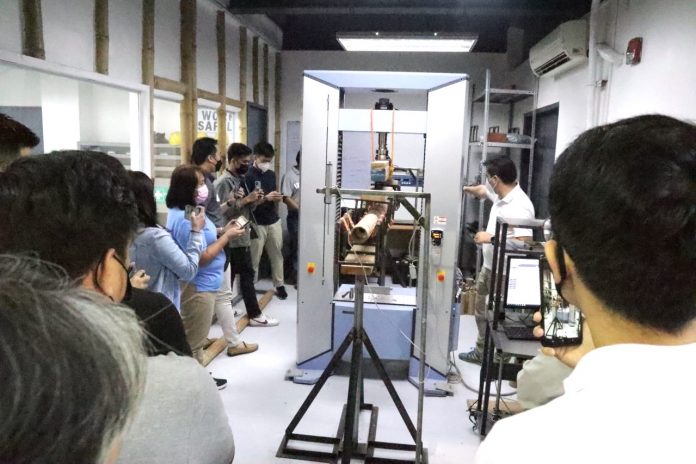
The Base Innovation Center (BIC), Base Bahay Foundation, Inc.’s (Base’s) International Hub for alternative building technology research, has been busy. Since it was inaugurated in early 2021, its constantly evolving bear witness to the weekly flurry of activity from experts and partners who are hard at work, studying how bamboo can be further optimized for use in mainstream construction.
At the country’s first research and testing facility for sustainable and disaster-resilient construction technologies, Base is leading the charge on research and innovation surrounding the use of bamboo for the affordable housing sector, and, eventually, the construction industry at large.
Committed to their vision of “Building sustainable foundations for the future”, some 1,500 homes all over the country have been built by partners for various beneficiaries using Base’s Cement-Bamboo Frame Technology (CBFT), which has been certified by the Accreditation of Innovative Technologies for Housing (AITECH) by the National Housing Authority, with over 300 civil engineers and architects trained in its use. Base targets to build 10,000 cement bamboo houses by 2024 in response to the growing need for socialized homes in disaster-prone areas, particularly in Luzon and the Visayas.
“As leaders in the field of sustainable housing technologies, we recognize that we play a pivotal role in ensuring that every Filipino has access to a home,” said Base Bahay General Manager Dr. Pablo Jorillo, referencing the country’s housing backlog as he points out bamboo’s abundance. “We hope to unlock more partnerships that will help us provide homes for more Filipino families.”
Shares Base Bahay Head of Technology Luis Felipe Lopez Munoz: “a key part of our commitment to promoting sustainable housing technologies is constant innovation. Our vision is to be the global reference for bamboo and sustainable construction in order to help countries find alternative construction methods.”
The Center houses a Universal Testing Machine, a Bamboo Wall Panel Reaction Frame, fabrication tables, and a model house, wherein new materials and building techniques are tested. Augmented reality is used to adopt and scale new technology for use in construction.
Resulting data will guide the development of a local structural code for bamboo, aligned with the Philippine National Standard (PNS) 22157 and the proposed International Organization for Standardization’s ISO 22156. The former determines the specific testing procedures for obtained bamboo culms, while the latter is meant to institutionalize the use of bamboo in structural design.
This year, the BIC is working with ETH Zurich and UP (University of the Philippines) on lifecycle and thermal comfort of cement-bamboo frame homes. Coventry University and Foundation University are piloting the application of bamboo grading and testing new bamboo connections.
Other ongoing research projects include the UST’s (University of Sto. Thomas) and MAPUA University’s characterization of different species of bamboo and testing of bamboo shear wall panels, and DLSU’s (De La Salle University) study of bamboo fiber geopolymer wall.
For more information on Base Bahay Foundation and ongoing projects, visit http://www.base-builds.com.






